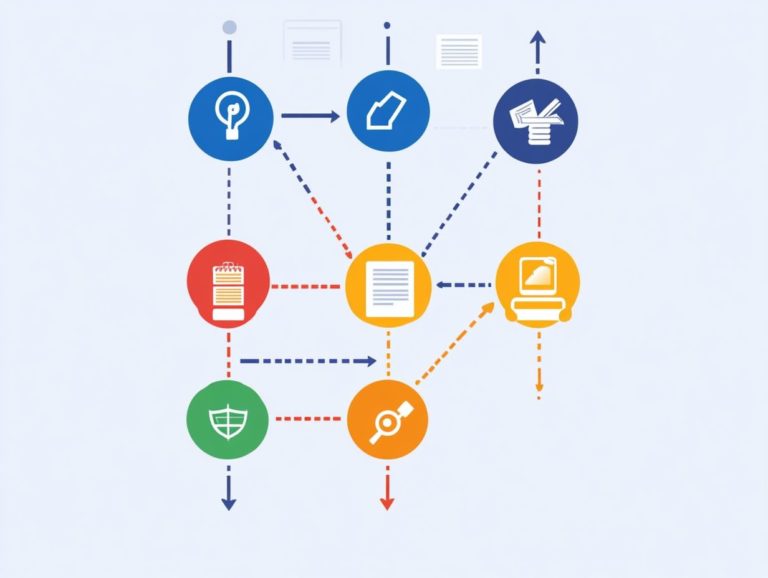Popular Project Management Certification Providers
In today’s fast-paced business landscape, mastering project management is crucial for your success. With many certification options available, choosing the right one can be overwhelming.
Let s explore the best project management certifications available! This article highlights esteemed certification providers such as the Project Management Institute (PMI) and Scrum Alliance. It outlines the benefits of obtaining certification, the various levels available, and guidance on selecting the right provider. It also explains how to maintain your credentials.
Whether you re just starting your journey as a project manager or looking to elevate your career, this guide equips you with the insights you need.
Contents
- Key Takeaways:
- 1. Project Management Institute (PMI)
- 2. International Project Management Association (IPMA)
- 3. Scrum Alliance
- 4. Agile Alliance
- 5. Axelos
- 6. Project Management Institute for Agile Certified Practitioner (PMI-ACP)
- 7. Certified Associate in Project Management (CAPM)
- 8. Certified Scrum Master (CSM)
- 9. Certified Scrum Product Owner (CSPO)
- 10. PRINCE2
- 11. Certified Project Manager (CPM)
- 12. Six Sigma
- 13. Lean Six Sigma
- 14. Certified Associate in Project Management for Six Sigma (CAPM-SS)
- 15. Certified Project Management Professional (CPMP)
- What Are the Benefits of Getting a Project Management Certification?
- Frequently Asked Questions
- What are some popular project management certification providers?
- What is the most recognized project management certification?
- What are the eligibility requirements for popular project management certifications?
- How long does it take to complete a project management certification?
- Do project management certifications expire?
- What are the benefits of obtaining a project management certification?
Key Takeaways:

PMI and IPMA are leading global providers of project management certifications, offering various options. For insights into what’s next in this field, check out the future of project management certifications. Scrum Alliance and Agile Alliance provide specialized certifications focused on Agile methodologies, which help teams respond to changing project requirements. Axelos offers certifications for PRINCE2 and ITIL, popular project management and IT frameworks, respectively.
1. Project Management Institute (PMI)
The Project Management Institute (PMI) is a global leader for project management professionals, offering certifications and educational resources designed to strengthen project management fundamentals. Engaging in structured training and understanding the role of certification in project management career can significantly elevate your skill set.
With a commitment to establishing standards and promoting best practices, PMI plays a vital role in shaping the development of project management as a distinguished profession.
Since its inception in 1969, PMI has profoundly impacted the project management landscape, driven by its mission to cultivate professionalism and provide members with essential tools for success. Among its array of certifications, the Project Management Professional (PMP) stands out as one of the most sought-after credentials, globally recognized for its rigorous standards.
These certifications validate your expertise and enhance your organization’s knowledge management by equipping teams with crucial skills and methodologies. As businesses increasingly recognize the importance of effective project management, understanding regional differences in project management certification ensures you are prepared to lead projects to success, aligning strategies with measurable outcomes and fostering a culture of continuous improvement.
2. International Project Management Association (IPMA)
The International Project Management Association (IPMA) is known for its comprehensive approach to project management. It offers certification frameworks that cater to project managers at all levels, helping you acquire a standardized skill set that aligns with global practices, including insights on the role of technology in project management certifications.
By emphasizing skills and competencies, IPMA encourages a holistic understanding of project management methodologies an essential foundation for effective leadership in diverse environments. Their certifications range from entry-level to advanced, validating your expertise and enhancing your adaptability to international standards.
When comparing IPMA with PMI, you’ll find that IPMA s competency-based framework prioritizes personal and professional development, highlighting the importance of continuous learning. This focus has significantly impacted project management education globally, cultivating a community of capable professionals prepared to navigate complexities across various industries.
Ready to boost your career? Choose a certification that fits your goals today!
3. Scrum Alliance
Scrum Alliance is a top organization that promotes Agile methods. It offers certifications like the Certified ScrumMaster (CSM) to help you lead Agile teams effectively.
Through its resources and training, Scrum Alliance improves your project management skills. A collaborative environment is key to this success.
Agile techniques are essential to thrive in today s fast-paced world! They adapt to changing requirements and prioritize customer satisfaction.
Getting certified by Scrum Alliance shows your expertise and builds your collaboration skills. You ll feel more confident tackling complex projects.
Scrum Alliance plays a crucial role in the Agile community. It sets standards that prepare you to drive successful project outcomes.
4. Agile Alliance
Agile Alliance is a leading advocate for Agile practices. It fosters a community focused on continuous improvement and flexibility in project management.
They cultivate collaboration among teams and offer valuable resources. This enhances stakeholder engagement and helps individuals excel.
With workshops and conferences, Agile Alliance equips organizations to embrace Agile with confidence. This leads to better communication and transparency.
Their efforts create a culture of responsiveness and innovation. This is vital for organizations aiming to thrive in today s fast-paced market.
5. Axelos
Axelos is a leader in developing PRINCE2, a structured project management approach. It provides a clear roadmap for managing projects effectively.
PRINCE2 focuses on clear processes and roles. This helps your team manage risks and resources precisely throughout the project lifecycle.
It’s adaptable, making it suitable for both small projects and large transformations. You can easily tailor it to meet your specific needs.
PRINCE2 also works well with other methods like Agile and PMBOK. This combination boosts collaboration and improves project execution.
6. Project Management Institute for Agile Certified Practitioner (PMI-ACP)
The PMI-ACP certification from the Project Management Institute showcases your Agile expertise. It highlights your ability to apply Agile techniques to enhance project outcomes.
Gaining this certification gives you a competitive edge. It validates your skills in Agile methods and boosts your capacity to lead dynamic teams.
The certification process dives deep into Agile principles. It encourages practical applications to help you manage modern project complexities.
This journey equips you with tools for managing change. You’ll also learn how to create a collaborative environment.
Ultimately, the PMI-ACP certification helps you achieve better results in today s evolving business landscape.
7. Certified Associate in Project Management (CAPM)

The Certified Associate in Project Management (CAPM) is an entry-level certification offered by PMI. It s your gateway to a fundamental understanding of project management.
This certification boosts your resume and confidence, showing that you can effectively contribute to any project team. To earn the CAPM, you need a secondary degree and 23 hours of project management education.
This certification is particularly valuable for aspiring project managers. It equips you with essential skills and knowledge for advanced roles.
Pursuing the CAPM shows your commitment to the profession. This step can lead to better career opportunities and further certifications like the Project Management Professional (PMP).
8. Certified Scrum Master (CSM)
The Certified Scrum Master (CSM) certification, offered by Scrum Alliance, is perfect if you’re eager to deepen your understanding of Scrum and agile methodologies. This certification gives you the skills you need to facilitate agile projects with finesse.
Typically, the certification process involves attending a training course led by a Certified Scrum Trainer, followed by passing an exam that assesses your knowledge of these frameworks.
By mastering agile principles, you gain invaluable insights that enhance your leadership abilities and elevate your team’s performance.
Your capacity to foster collaboration, streamline workflows, and respond to changes is crucial for driving project success. You will become a linchpin in guiding teams through the complexities of project execution, ensuring objectives are met while maintaining a flexible approach.
9. Certified Scrum Product Owner (CSPO)
The Certified Scrum Product Owner (CSPO) certification enables you to step confidently into the role of a Product Owner within an agile team. You’ll focus on maximizing product value by engaging effectively with stakeholders and prioritizing project features.
This certification is essential, as it gives you the skills to foster collaboration among team members, creating an environment that thrives on open communication. You ll align project goals with business objectives more effectively, ensuring that everyone shares a common vision.
By refining these collaborative skills, the CSPO enhances your overall workflow and enables your team to respond swiftly to changing requirements. This adaptability improves your processes and leads to more successful outcomes in agile projects.
10. PRINCE2
PRINCE2 is a highly regarded project management framework that offers a structured approach to delivering projects. It places a strong emphasis on organization and control throughout the project life cycle, helping you achieve great results across diverse project environments.
The methodology is built on seven principles, themes, and processes that guide you in managing and customizing projects to meet specific requirements. By concentrating on these foundational elements, you enhance clarity in roles, responsibilities, and decision-making, making it especially relevant in today s fast-paced business landscape.
Jumping into PRINCE2 equips you with essential tools for meticulous scheduling and efficient risk management. This enables you to anticipate potential obstacles and allocate resources wisely. This proactive strategy minimizes risks and elevates stakeholder satisfaction, fostering an environment of continuous improvement and adaptability.
11. Certified Project Manager (CPM)
The Certified Project Manager (CPM) designation shows your skills in managing various projects. It highlights your ability to lead teams and tackle complex challenges.
This certification validates your expertise and shows your commitment to professional growth. Unlock your potential with this certification that validates your expertise!
To achieve the CPM, you need specific education, project management experience, and to pass a comprehensive exam.
For senior project managers, earning the CPM is vital. It provides advanced methods and strategies for managing high-stakes projects.
Key skills like risk assessment, resource allocation, and stakeholder communication enhance your leadership qualities. This makes you a valuable asset to any organization.
12. Six Sigma
Six Sigma is a data-driven method designed to improve processes and eliminate defects. It equips you with effective techniques for quality and efficiency.
This methodology uses statistical tools and quality principles to streamline operations. It also boosts customer satisfaction by addressing the main factors that cause problems.
Integrating Six Sigma into your strategy fosters teamwork and accountability. It promotes a culture of continuous improvement.
This alignment with ongoing initiatives helps you resolve issues while evolving processes. The result is sustainable performance gains and a competitive edge.
13. Lean Six Sigma
Lean Six Sigma combines Lean manufacturing and Six Sigma principles to boost project efficiency. It offers a framework for continuous improvement and waste reduction.
This approach helps identify and eliminate bottlenecks, streamline workflows, and improve quality. It promotes collaboration and empowers team members.
When applied in various fields like construction or healthcare, it ensures consistency in results. By nurturing data-driven decision-making, you achieve long-term success.
14. Certified Associate in Project Management for Six Sigma (CAPM-SS)

The Certified Associate in Project Management for Six Sigma (CAPM-SS) is perfect for those beginning their project management journey. It covers essential Six Sigma principles and project management skills needed for quality improvement.
This certification introduces vital methodologies for effective project management. It emphasizes the importance of quality assurance throughout the project lifecycle.
To earn the CAPM-SS, you must meet educational and experience prerequisites. This ensures you are ready for future challenges.
Completing the coursework and passing the exam gives you insights into tools that enhance process improvement.
Ultimately, this certification is a stepping stone. Don t wait! Start your journey today and build a strong skill set, advancing your career and leading to successful project outcomes.
15. Certified Project Management Professional (CPMP)
The Certified Project Management Professional (CPMP) is a mark of excellence. It shows your advanced skills in leading teams and your commitment to high project management standards.
This credential highlights your ability to manage complex projects and improve team collaboration. It ensures projects are delivered on time and within budget.
For those aiming for career growth, earning the CPMP certification significantly boosts your marketability. It reflects your dedication to lifelong learning and excellence.
With this certification in hand, you ll enjoy increased earning potential and a wealth of job opportunities. Employers recognize the value that certified professionals bring to their organizations.
By pursuing this esteemed qualification, you gain a deeper understanding of industry best practices. You also become part of a community of like-minded professionals committed to driving successful project outcomes.
What Are the Benefits of Getting a Project Management Certification?
Getting a project management certification offers many benefits. You ll gain better skills, improve engagement with stakeholders, and increase your job prospects.
The certification opens doors to career advancement opportunities. It allows you to climb the corporate ladder or transition into roles with greater responsibilities.
This certification enriches your project management experience. You gain access to cutting-edge ways of doing things and best practices, including insights from the top 5 certifications for project leaders, ensuring that you can apply effective techniques across various project environments.
This versatility boosts your confidence and helps you build a robust professional network. It facilitates collaboration and growth in the ever-evolving landscape of project management.
What Are the Different Levels of Project Management Certifications?
Project management certifications vary from entry-level to advanced. Options like CAPM help beginners, while PMP is for experienced professionals looking to enhance their skills with the top project management tools for certified professionals.
Entry-level certifications focus on foundational knowledge. They equip you with the essential skills needed to navigate the complexities of the field.
As you advance in your career, consider mid-level certifications like PMI-ACP, which emphasizes agile ways of doing things, or PRINCE2, known for its structured approach to project management.
When you reach the pinnacle with advanced certifications like PMP, they demand a thorough understanding of project management principles and considerable experience in leading projects.
The path to these certifications involves rigorous training programs, workshops, and hands-on experience. All are designed to deepen your knowledge and bolster your credibility in an increasingly competitive job market.
How Can One Choose the Right Certification Provider?
Choosing the right certification provider is crucial for aspiring project managers, as it impacts both the training quality and the recognition of your credentials. For more insights, check out understanding project management certifications.
When evaluating a provider, make accreditation your top priority. This confirms that the program adheres to established industry standards.
Look closely at the course content to ensure it covers the core principles and methodologies of project management.
Don’t underestimate the importance of the provider’s industry reputation. Positive testimonials and successful alumni can be strong indicators of the training s effectiveness.
To make a well-informed choice, compare various providers, seek insights from industry professionals, and evaluate their post-certification support and networking opportunities.
Make a smart choice to ensure your investment pays off in your career.
What Are the Requirements for Obtaining a Project Management Certification?
Obtaining a project management certification typically means you ll need to meet specific requirements. This often includes a blend of education, project management experience, and passing a certification exam that showcases your proficiency in the fundamentals of project management.
For many aspiring candidates like yourself, having a relevant degree can provide a solid foundation. Hands-on experience across various projects helps you hone practical skills. It s also beneficial for prospective certification candidates to grasp the nuances of project assessment, as this plays a vital role in the certification process.
This assessment checks what you know and how well you can use that knowledge in real-world scenarios. Ultimately, it ensures you re fully prepared to tackle the challenges of leading projects effectively.
How Can a Project Manager Maintain Their Certification?
To maintain your project management certification, you must engage in ongoing learning and continuous improvement. This means fulfilling specific continuing education requirements and staying updated with the latest project management trends and best practices.
Actively participating in workshops that delve into emerging tools and methodologies is essential. These opportunities not only enhance your skill set but also provide invaluable networking connections.
By taking advantage of various training programs, you can deepen your understanding of complex project scenarios and sharpen your decision-making capabilities. Knowledge management is vital.
Regularly sharing what you learn from completed projects aids your individual growth while contributing to your team’s collective intelligence. This ensures that excellence in project management practices is not just a goal but a sustained reality.
Frequently Asked Questions

What are some popular project management certification providers?
Some popular project management certification providers include:
- Project Management Institute (PMI)
- International Project Management Association (IPMA)
- Scrum Alliance
What is the most recognized project management certification?
The Project Management Professional (PMP) certification by PMI is currently considered the most recognized and prestigious project management certification globally, making it one of the top project management certifications for 2024.
What are the eligibility requirements for popular project management certifications?
The eligibility requirements vary depending on the certification provider. Generally, applicants need to have a certain number of hours of project management experience and/or education. For example, the PMP certification requires:
- A minimum of 35 hours of project management education
- 4,500 hours of project management experience
How long does it take to complete a project management certification?
The duration of completing a project management certification depends on the individual’s pace of study, availability of study materials, and scheduling of the exam. On average, it can take 3-6 months of dedicated studying to prepare for the exam.
Do project management certifications expire?
Some project management certifications, like the PMP, require holders to maintain their certification by earning a certain number of professional development units (PDUs). PDUs represent the hours of learning you must achieve to maintain your certification. If these requirements are not met, the certification can expire.
What are the benefits of obtaining a project management certification?
Obtaining a project management certification can provide individuals with increased job opportunities, higher salaries, and credibility in the industry. It also demonstrates a commitment to continuous learning and professional development in the field of project management.






